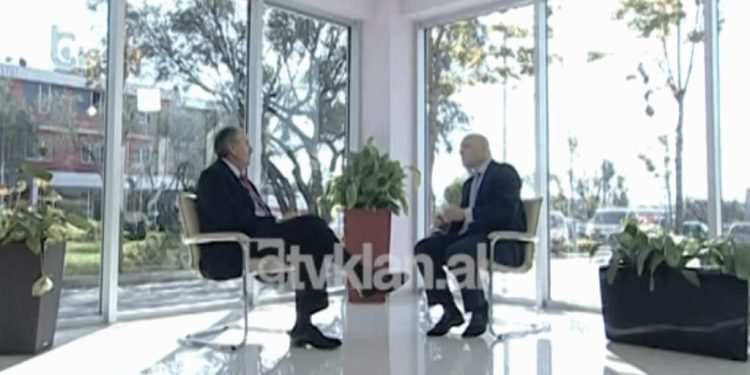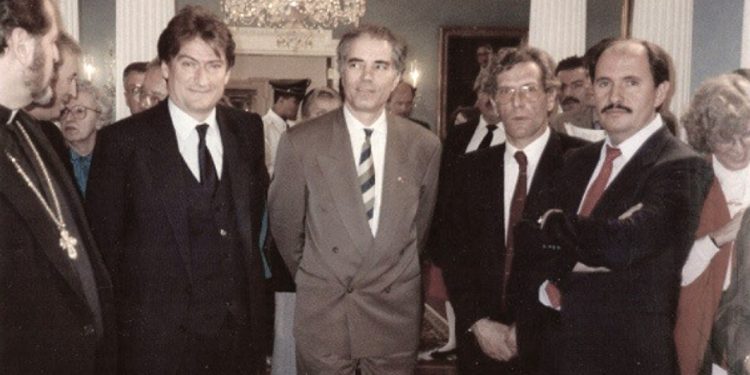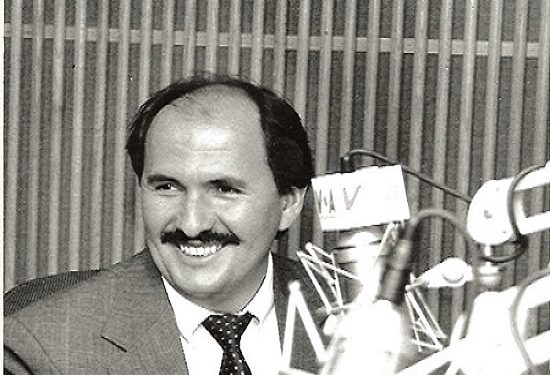Part Two
-Interview of journalist Blendi Fevziu on the Opinion show on TV Klan, with the former head of the ‘Albanian’ section of Radio “Voice of America”, about her role in the overthrow of communism in Albania
Memorie.al / Returning to Tirana on the occasion of a conference for the 20th anniversary of the change of the political system in Albania, Elez Biberaj, director of the Euro-Asia Division at Radio “Voice of America” and responsible for broadcasts for the Russian-Ukrainian language and for the Balkan countries and Albanian, shares his memories of 1991, on the “Opinion” show of journalist Blendi Fevziu on TV Klan. How he met Gramoz Pashko and Sali Berisha and how he interviewed Fatos Nano and Ismail Kadarena and what was the opinion of the US Secretary of State, James Baker, after his visit to Albania?!
Continued from the previous issue
Mr. Biberaj, did you know about Ramiz Ali’s meeting with the intellectuals?
We found out about it very late, maybe about 2-3 weeks later.
How do you remember Kadare’s escape?
We received the news very early. For me it was sad news. I thought that everything was over in Albania if Ismail Kadare, the only real hope, left.
Did you get the information from the international press?
No, we got it from Kadare’s publisher.
Did you try to contact Kadare yourself?
Of course. I had contacts with Kadare even before his escape, but he did not let me know that he wanted to escape. That day, they immediately sent us his statement by fax and we read it on the program. It was a rather difficult manuscript, so it took us some time to decipher it.
You tried to establish contacts immediately, to get opinions in Albania and Kosovo. What were the opinions of Albania and Kosovo, about Kadare’s escape?
I have the impression that they are different! That day, the Conference of Balkan Foreign Ministers was taking place here and Laura Sillet had come here to find another correspondent for “Voice of America”. In Tirana we had quite good coverage, which did not happen in other cases. The problem was that here, people did not accept to talk.
But I have the impression that the students who were contacted on the street, almost all of them spoke?
Yes. The reaction here about Kadare was almost very negative. There were some statements from the Writers’ League. My concern was that based on the government’s actions in the past, although at that moment the reaction was very weak, the pressure from outside had increased, Kadare’s escape proved that Alia no longer enjoyed the support of intellectuals, which was very important, and did not want to make changes, or made changes very slowly.
There was a possibility, although the government was weak, that a terrible campaign would begin against Kadare: “Kadare betrayed the homeland, Kadare, enemy, etc.” I was also concerned about the reaction from Pristina. I immediately contacted Rexhep Qose. If Pristina as a whole came out in support of Kadare, official Tirana would have a harder time undertaking a campaign against Kadare. What was more important, the intellectuals’ coming out against the regime, in support of Kadare, could encourage intellectuals in Tirana to also take a more defensive stance.
And Rexhep Qose’s reaction…?
Rexhep Qose’s reaction was very, very interesting, he supported Kadarena, praised President Alia, and there is even a sentence where he says: “You are the prophet of Albanian democracy”, and called on him to allow political pluralism in the country. Qose’s interview was decisive. Apart from Adem Demaçi, no other intellectual in Kosovo has come out to criticize Kadarena. Everyone lined up in defense, behind Rexhep Qose.
What about the reaction in Tirana?
The first reaction from Tirana was an interview we conducted with Gramoz Pashko, and this was a week later. It was the most courageous interview that “VOA” broadcast during that year. The interview with Kadare in Tirana, in September of that year, I consider the interview of the year. But Pashko’s interview was very courageous. He came out openly, not only in support of Kadare, and said: “If fundamental reforms do not begin here immediately, this country is heading towards a collapse.”
And you knew that something would happen very soon?
No, we did not know, but we were prepared to cover the events. We were convinced that in January, when the riots began in Shkodra, in Kavaja, it was no longer a question of whether the Albanian regime would fall; it was only a question of when and how violently the fall would be.
Meanwhile, in the Central Committee of the Albanian People’s Party, they have accused you that “VOA” and you personally had information about what was happening in Albania on December 8th in “Student City” and they link this to the fact that in the VOA show on December 8th, you rebroadcast Rexhep Qose’s statement about Kadare’s departure, when there was no reason for it to be broadcast?
(Laughs) Very interesting. Qose’s interview caused a lot of fuss, not only here in your country, but also in Kosovo. We had many requests to rebroadcast it and that was the reason.
So, you didn’t expect anything to happen in “Student City”?
Absolutely not.
How did you get the information about the event?
I received a phone call in the early hours of Sunday, December 9th. A phone call to my home. The person calling asked me: “Are you Elez Biberaj?” I said, “Yes.” He told me that; “Demonstrations have started at the University of Tirana, the government has taken very strict measures and is suppressing them, it is very important that ‘Voice of America’ broadcasts about this” and hung up the phone. In short, I didn’t have the opportunity, not even to ask!
Did you ever find out who he was?
No. In May, in my contacts with Albanian intellectuals, especially with Gramoz Pashko and Fatos Nano, in addition to my office phone numbers, I had also given them my home phone numbers. It is possible that Gramoz gave someone my phone number, because the call was at home.
How did you react? It was Sunday morning, not a working day?
I went to the office immediately. You mentioned the rebroadcast of Rexhep Qose’s interview. A listener from Tirana called me often, 3-4 times, within two months and we had developed a kind of relationship. This was one of the listeners, who asked to rebroadcast Qose and I told him; I would do this only for you. That day when I came to the office, I called this person. I told him that I had some reports, about riots and rallies. No, he told me, that my house is near the university. I had no idea where the university was. Someone was trying, he said, with fake hooligans, he told me something like that. So; nothing happened. After 2-3 hours “Reuters” confirmed it. That day there was not much news. I could not connect with Tirana, I called Gramoz, etc., but without success.
Mr. Biberaj, had the phone calls with Albania collapsed that day?!
Yes, I don’t know what had happened! Incidentally, that day, we had prepared an interview with Kadare. Dejvid Bajdner had conducted an interview with Kadare a few days earlier, in writing, and he asked me to translate it, because Kadare’s answers were in Albanian. The interview was very long. On December 8, he published an article based on the interview, the article was very short. On the 8th, we mentioned the article. I asked Bajdner to broadcast the interview and the interview ended up being about 6-7 minutes. It was very long. On the 9th, we had a news story about Kadare and a news story about the events here.
Then, how did you find out what was happening?
Then we connected by phone from Tirana, we had interesting calls. I don’t know even today, but a person called me often and used a pseudonym, “Good Will”. Interestingly, in this person’s calls, he didn’t stay on the phone for more than 30 seconds.
Did he give you information?
Yes, he gave you very accurate information, but he didn’t stay on the phone for more than 20 seconds and called again after 30 minutes.
Did you ever find out?!
I never found out and I would be very interested in getting to know that person.
Were you able to follow the developments of the events? Since there was intensity and the events were developing so quickly, even we here couldn’t follow them?
Yes, we were totally engaged, 24 hours in total.
And did you manage to get the information that political pluralism had been declared?
I got the news from Gramoz Pashkoja. On the morning of December 12, he called me at home and said; “we won” and he was with Dr. Berisha and gave me Dr. Berisha on the phone.
Did you know Dr. Berisha?
No, I didn’t.
Was this the first contact with Dr. Berisha?
I had read his writings. I had an analysis, for an article by him and Hamit Beqja, in May. The article was published in the fall in “Bashkimi”. I had tried to contact him, but I never got a phone number. I have the impression; these were our sources, that he did not have a phone at home, but only at the hospital. On December 10-11, the entire program was dedicated to the events here. That day, I myself did an analysis, where I said that; if Alia does not accept the conditions, Albania is heading towards an uncertain reality. We also had an interview with Rexhep Qose, where he called on Mr. Alia, to accept the students’ demands.
Mr. Biberaj, while you were learning about the creation of the DP…?
After the phone call with Gramoz, I spoke with Dr. Berisha and they told me that a rally would be held that day and the creation of the DP would be announced. That day, we had a full interview with Pashko, Berisha and Azem Hajdari.
Was the creation of the first opposition party unexpected for you?
No.
Did you think it would happen?
It definitely would happen.
Did you or a VOA platform have the opportunity to identify 2-3 leaders of this party, or more?
Absolutely not.
Were there any comments in this regard?
Yes, I know, there has been a lot of speculation, absolutely not. Even today, if our interviews exist somewhere, even in January 1991, in the interviews with Dr. Berisha, in the presentation of the interview, we said, one of the leaders of the Democratic Party. At that time, two leaders were identified, Pashko and Berisha, the other people, they had no charisma.
Had you also identified it in VOA, or the US administration?
Of course, but it was identified here in Tirana. Not with us.
They arrived in the US in 1991, was that your first contact with them?
Yes. What were important to us were the process and not the characters. And there was so much chaos here and the experience of other Eastern European countries that leaders come on stage and can be overthrown immediately. What was important was that this process was peaceful.
What was your first impression of them in Washington?
They came as official guests, on behalf of the American Government, on the occasion of the establishment of diplomatic relations. The impression I had was very positive. The conversations with Gramoz were freer, perhaps also because of the contacts we had before. Maybe also because of age, but he was very open. Whereas Dr. Berisha, very serious, even in the meetings with officials that I attended, he was very serious, punctual.
What was the impression that this new opposition left in Washington?
Quite positively, this was immediately reflected in the almost total support from the US government for the Democratic Party and other opposition parties.
How do you remember the toppling of the bust of Dictator Enver Hoxha, which was preceded by the student hunger strike?
I return again to the fear that I personally had about violence. Maybe I am wrong, but that was the most delicate point and Albania has never been closer to a civil war, in my opinion, than during those days. Covering that event for us was much easier, because we had contacts. The DP had also created the Information Office.
Did you see the images yourself that day?
Not that day. We were very busy and it was very difficult to connect with Tirana that day.
Was there an agreement with VOA and DASH to choose the opposition leaders?
Absolutely not. We are a government entity, but there was no agreement where they could give, where they could say, gives this material, or don’t give it.
No, informal consultations, regarding the personality of the leaders who were in Albania?
No, not once.
One of the highlights when you came to Albania was the visit to the elections of March 31 and the second, the visit of the US Secretary of State, James Baker. How did you make the decision to come to Tirana?
I was invited by the Helsinki Commission to come to Albania in August 1990, but Tirana did not give me a visa. But things had already changed and the government could not refuse the visa and I came with the delegation of the US Congress, of the Helsinki Commission.
What was your impression of Albania; did it match what you thought?
From a young age, I had dedicated my life to studying the Albanian issue and I thought I had an idea of what the situation was like here. But in reality, it was much worse than I had thought.
How can I say much worse?!
Desperate people, deprivation in all aspects, painful poverty.
And you, who were a researcher of Albanian issues, had not managed to predict this situation?
No. It was much worse than I had thought.
And you returned again in June 1991, during Secretary Baker’s visit. How do you remember this visit?
Very intense. The rally in the magnificent “Skënderbej” Square.
What was Secretary Baker’s reaction?
He was so impressed that immediately after returning to the US, a Task Force was created, I was a member of it myself, and immediately began the engagement, the assistance for the media here, for the opposition parties, to prepare for the elections.
Was there skepticism about the way Baker was received, before arriving in Tirana?
No, it was known that he had an American disposition.
What were the most impressive interviews, of all the Albanian characters?
With Dr. Berisha, a month after the founding of the DP.
Why was it impressive?
Because his thoughts have evolved. You certainly remember the first reactions, the first interviews immediately after the founding of the DP, the praise for Ali and all that. I have the impression that at the beginning, the opposition leaders did not have a clear program. But within a month, it was clear that Dr. Berisha had a plan.
Within a month?
Yes.
He had a project, in what sense?
He had a vision, of where things should go.
Something that was not evident in other opposition leaders…?
No, honestly not.
And the other interviews?
With Gramoz Pashko, with Azem Hajdari. I have followed the events in Eastern Europe a lot and I assumed that Albania would face the same problems and in the first interview, after the creation of the DP, it was a fairly long interview with Azem Hajdari, one of the questions was: Was permission obtained to overthrow communism, or was democracy being built?!
What was his answer?
He replied that; it was very difficult to overthrow communism, but we are prepared, we know that everything means a democratic system, etc.
What role is VOA playing, in all Albanian lands?
I am now the director of the Euro-Asia Division, I am responsible for broadcasts, for the Russian-Ukrainian language and for the Balkan countries and Albanian of course. Every year, this is by law, we must conduct surveys and these are conducted independently. The last survey here was in September. We have a weekly audience of 46 percent. In Kosovo, 65 percent.
How is Albania today, compared to when you first came?
There is no comparison, without a doubt very good. Memorie.al















